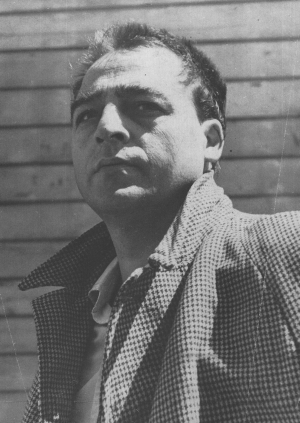Poet Kenneth Patchen was born in Niles, Ohio, 100 years ago on December 13, 1911. He died in Palo Alto in 1972. Due to a ruptured spinal disk that was never properly treated, Patchen produced some 30 volumes of poetry and prose largely from the confines of his bed — work, nonetheless, that fiercely engaged the modern world that raged on outside. In his words, “I speak for a generation born in one war and doomed to die in another.” For this, the Beats were deeply indebted to his work. Patchen however, who lived in Telegraph Hill in the 1950s, referred to “Ginsberg and Co.” and the media hype surrounding them as a “freak show.”
Patchen had a broad range — he could be political, tender, devotional, and surreal — and unlike the Beats, he vehemently opposed being labeled as one kind of poet or another. Kenneth Patchen: A Centennial Selection (Kelly’s Cove Press, paperback, $25), edited by Patchen’s friend Jonathan Clark, marks the 100th birthday of the indefinable poet. Clark first met Patchen in the 1960s as a teenager living in the same Palo Alto neighborhood as him. He describes the collection as “a personal selection of some poems in which I hear most clearly the voice of the man I remember…those seeking perfection had best look elsewhere…” Fair enough. However, the collection is also a reasonable review of the poet’s scope. And, if indeed modest, it’s still the only book that has observed the centennial.
Although he wrote poems of all kinds, Patchen was always an adamant pacifist with a social conscience. He could be blunt and unsparing in this regard. In an essay from 1946, novelist Henry Miller described Patchen with slight terror and open-mouthed awe as “the living symbol of protest:” “He is a fizzing human bomb ever threatening to explode in our midst.” It’s a disputed description of the man. But if one had been reading Patchen’s work and nothing of his life, it would sound befitting enough. In one poem alone, “What I Want to Know Is,” he refers to politicians as “filthy lying lice,” “foul bastards,” “lousy bastards,” and “frauds and fakers.” Patchen’s pacifism is closely tied to what he sees as the loss of innocence in society, the corrupted human spirit, and is often expressed with animals. Such is the case with the forbidding “The Lions of Fire Shall Have Their Hunting:”
The lions of fire
Shall have their hunting in this black land
Their teeth shall tear at your soft throats
Their claws kill
…………………………………..
Because you are sick with the dirt of your money
Because you are pigs rooting in the swill of your war
Because you are mean and sly and full of the pus of your
pious murder
Clark has also included a selection of Patchen’s artwork in the book (though the cover and back images are not the poet’s best). Patchen first started painting in 1942 to make cover illustrations for his book The Dark Kingdom, and it eventually led him to reimagine all his subsequent volumes. Larry Smith, Patchen’s biographer, notes that Patchen pioneered “the painted book, the concrete poem in which type set is used to paint the poem on the page, the drawing-and-poem form, the poetry-prose experiments of his anti-novels, and finally the picture-poem form.”
In A Centennial Selection, the artwork ranges from animals reminiscent of Chagall with words floating around them, such as “peace now for all men or amen to all things,” to an untitled work that would have been in line with Patchen’s New York School contemporaries. The latter is proof that Patchen was a painter in his own right, not simply a poet with a paintbrush. Franz Kline, upon seeing his art, called Patchen “more of an artist than most artists today.”
Patchen’s poems, especially those with a political edge, are as relevant as they ever were. It’s an appropriate coincidence that the Occupy Movement — and more recently, Take Back the Capitol — should correspond with Patchen’s 100th birthday. From his first volume of poetry in 1936, Before the Brave (which the New York Times categorized as Marxist), Patchen wrangled with the same questions that many people are weighing today — questions of power and greed, corruption, accountability, and of course, war. Patchen, who was invariably poor his whole life, saw things as a collective human struggle, and he placed himself squarely in that struggle with his poetry.
As Clark admits, A Centennial Selection has its shortcomings. But it’s a nice way to revisit Patchen’s poems and artwork and to see how both continue to work and be relevant today. Newcomers to Patchen, however, best refer to The Collected Poems.
Here are two of Kenneth Patchen’s best recordings, poems which are included in A Centennial Selection: the droll “State of the Nation” and the unusual “The Origin of Baseball.” Here you can pick up on Patchen’s dark and uncanny sense of humor.

